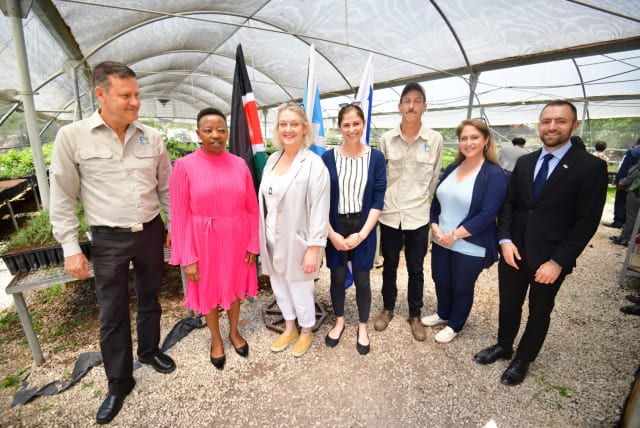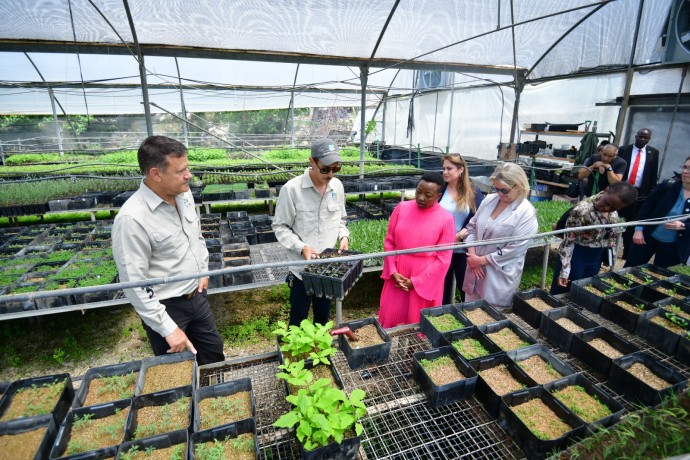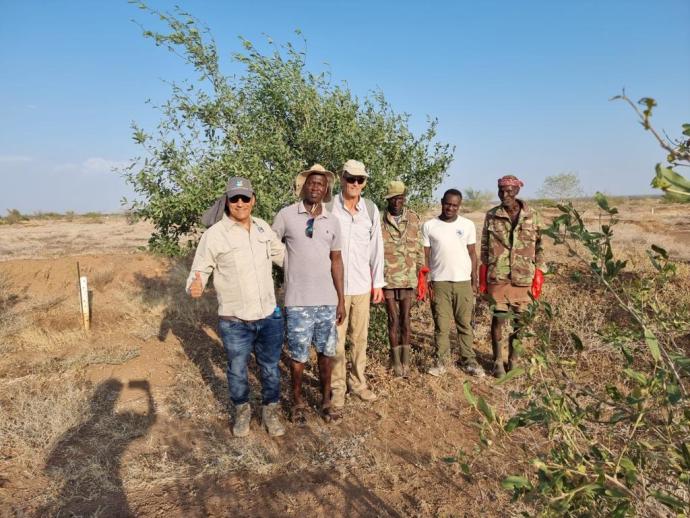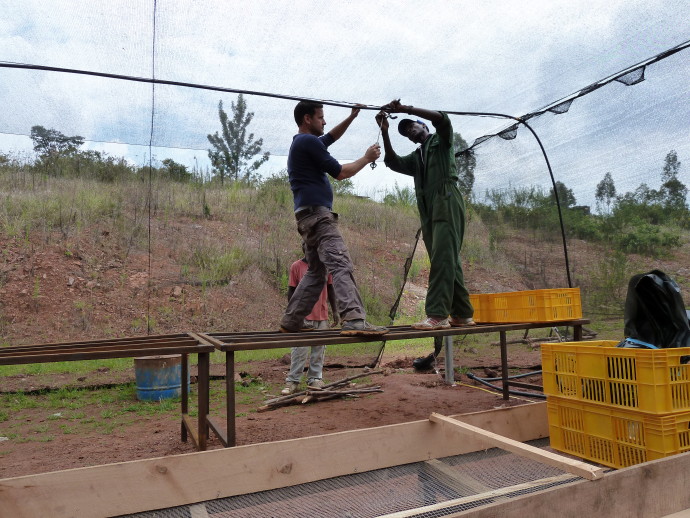KKL-JNF brings 122 years of knowledge to Africa in the fight against climate change

Over the years, KKL-JNF has transformed the dry landscape, ensuring water security for millions of people and making Israel a pilot site for resilience to climate change.
Pioneering and innovation are intrinsic to Israel’s identity. Over the past 122 years, Keren Kayemeth LeIsrael (KKL-JNF) has emerged as a global leader in afforestation, environmental technologies, water resource management, and sustainability. Through dedication, manpower, and ingenuity, KKL-JNF has transformed the dry landscape, ensuring water security for millions of people and making Israel a pilot site for resilience to climate change. While Israel remains a focus, KKL-JNF now extends its expertise in enhancing resilience globally, sharing knowledge and resources with African communities, and making Israel a model for environmental creativity.
For Karine Bolton Laor, KKL-JNF’s section head of intergovernmental relations, the organization’s focus on combating climate change is a challenge that does not stop at Israel’s borders.
“We need to work here in Israel for our own environmental well-being but [also] keep in mind that the rest of the world is looking towards Israel for its knowledge and technology,” she says.
“We see ourselves as part of a global effort, as these are issues that affect everyone, everywhere. Israel’s expertise, out-of-the-box thinking, and adaptation of our models are Israel’s forte and have made the country into a living laboratory.”
Despite its small size, Israel encompasses several climate zones, with over 50% of the country constituted by the Negev desert. Proper watershed management is a key factor in the Negev, and KKL-JNF’s work in this region has helped to increase biodiversity and prevent soil erosion and loss of nutrients in order to assist agriculture and grazing and create a better quality of life for the residents – all key outcomes that are supporting communities throughout Africa with similar climates.
In Turkana, Kenya’s poorest region, with climate conditions akin to Israel’s Negev desert, harsh environmental conditions and extreme droughts cause food insecurity and hinder development.
Established in 2012 as a joint initiative of a Catholic mission in Kenya and Israeli development organizations, Furrows in the Desert (FID) is an agricultural development program that adapts methods, that have been developed in Israel, to the environmental and cultural conditions of Turkana aimed at increasing local food production and improving food security.
KKL-JNF director of afforestation Gil Siaki and Moti Shriky, KKL-JNF director of soil conservation for Israel’s southern region, joined this initiative in 2019, bringing to it the rich knowledge that KKL-JNF has acquired in Israel in watershed management to the community in Turkana.
“Through Furrows in the Desert, we had the access to local communities to come and train local farmers in water runoff catchment and land reclamation, and rehabilitation practices we adapted from Israel,” Siaki explains, emphasizing the importance of partnership with the local Turkana people.
“The beauty of the Furrows in the Desert development program in Turkana is that the agricultural training and watershed management project are complementing each other, and the partnership is amazing. We have many people there that have come to work together with us and have helped to make this project a success.”
The Forestry Service of Kenya officially signed a memorandum of understanding with KKL-JNF in 2017 for combating desertification and promoting afforestation, and continues to work cooperatively for the mutual benefit of both countries.
Many environmental organizations collaborate as part of a professional exchange of knowledge, but the underlying Jewish aim of tikun olam (“repairing the world”) also plays a major role in KKL-JNF’s responsibility to support countries suffering from the impact of climate change. Additionally, the unique knowledge that KKL-JNF has secured through decades of activity ideally positions the organization to forge lasting relations with countries throughout Africa and the Mediterranean region.
Aviv Eisenband, KKL-JNF director of forestry and professional development, traveled to Rwanda in 2011 to help the Agahozo-Shalom Youth Village for local orphans and at-risk youth, following the terrible years of genocide.
Training local leadership and youth at the rural agricultural village, Eisenband and his team, supported by beehive experts from the Israeli Agriculture Ministry, helped build a sustainable forestry and agricultural center, as well as the honey-producing initiative Sweet Honey for Peace. The Israeli team brought seedlings for trees suitable for reforestation in Rwanda – including many eucalyptus species for which bees have a strong affinity (resulting in high nectar and pollen production), as well as to create a thriving habitat for the honeybees. Eisenband did not only help to build a successful farm but also gave the youth of Rwanda the tools to reach their potential as contributing members of their local community.
“KKL-JNF, traditionally, feels that it is part of our mission to not only contribute within Israel but a;lso to be a light unto the nations through our work in afforestation and agriculture. This [also] helps strengthen our standing throughout the world,” explains Eisenband.
According to Bolton Laor, when the Rwandan government saw the success of the village and the impact that Israel had made in the local community, it helped to further strengthen relations between the countries, which had been strained for many years. Today, Rwanda serves as a strategic partner in the United Nations, as well as for bilateral economic development.
Through KKL-JNF’s efforts toward a more globalized impact on combating climate change, more African countries are officially recognizing the organization’s work on behalf of the State of Israel, and through their shared mission for a more sustainable and eco-friendly future, have entered into numerous agreements and partnerships.
In 2021, KKL-JNF signed a memorandum of understanding with the Republic of Chad, sending experts in “dry lands” to identify the water and afforestation challenges facing the landlocked country. One of the outcomes of these fact-finding delegations is a new initiative to assist with and consult on date production, supporting local palm tree plantations and strategically identifying ways to bolster local food security.
For Esti Goldwasser, head of international relations and external affairs for KKL-JNF, the knowledge and expertise that Keren Kayemeth LeIsrael has gained over more than a century positions it as Israel’s agency for supporting a global climate crisis change.
“As a result of our network of professionals with deep knowledge in the fields of afforestation, ecology, and water resource management,” Goldwasser says, “through connections with alike experts around the globe and our partnership with the Israel Foreign Affairs Ministry, we can help secure stronger global connections and develop the work we are undertaking for the benefit of humankind.”
The article was written in cooperation with KKL-JNF
Jerusalem Post Store
`; document.getElementById("linkPremium").innerHTML = cont; var divWithLink = document.getElementById("premium-link"); if (divWithLink !== null && divWithLink !== 'undefined') { divWithLink.style.border = "solid 1px #cb0f3e"; divWithLink.style.textAlign = "center"; divWithLink.style.marginBottom = "15px"; divWithLink.style.marginTop = "15px"; divWithLink.style.width = "100%"; divWithLink.style.backgroundColor = "#122952"; divWithLink.style.color = "#ffffff"; divWithLink.style.lineHeight = "1.5"; } } (function (v, i) { });




